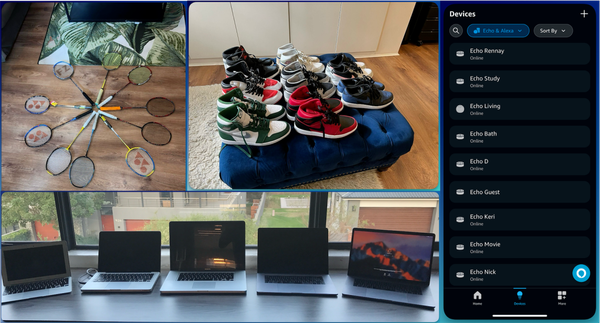5 Ways Working at AWS Differs from My Previous Employment Experiences - Some of Which I’m Still Getting Used To

Over the last 30 years, the “Amazonian” approach has evolved and cured. Although many approaches such as working backwards or two-way-door decisions may seem painfully obvious, these form the foundation of how the behemoth operates and moves forward so efficiently. In this piece, I highlight a few of the differences I’ve (personally) observed working at “Amazon”.
Some of these, such as the Leadership Principles and Data Driven approach, is the reason why Amazon has been so successful. The thinking, way of work and approach is also what many organisations are aiming to inject into their culture - hoping to deliver products and services with the same speed, quality and scale. Working at AWS for the last 2 years has been an incredibly rewarding, and often humbling, experience. However, as the title says, some aspects are still growing on me.
#1: Engrained, but sometimes conflicting, Leadership Principles
Anyone joining Amazon will encounter the Leadership Principles (LPs) during the hiring process.
Every company I’ve worked for has principles - some similar. The difference is that these LPs are deeply engrained into the organisation and is referenced long after the recruitment process, on a daily basis! You will often hear heated conversations about diving deep enough or not showing more bias for action. We get peer feedback according to the LPs - to identify areas of strength and improvement. As an example, my peers have given me kudos for diving deep, but have essentially called me out for not focusing more on developing or coaching younger members of the team.
I must admit that I am still adjusting to the conflicting nature of the LPs. More seasoned veterans of the company have indicated that this is intentional! As an example, diving deep often requires a significant time commitment to clearly understand a technical domain. However, this might be seen as not being frugal with time. If I had more time, I should be spending it on developing the best. Get it?
Diving deep is good, but spending too much time in the detail is bad, which takes you away from doing other good deeds - like mentoring/teaching.
#2: Tech Culture - Connected, but Disconnected
AWS is a true technology company. The dress code is typically T-shirt and jeans - there are no airs and graces. Office spaces are funky and geared for quick collaborations - with the proviso that all participants must stand.
A vivid memory, from university, which springs to mind is students (myself included) using Internet Relay Chat (IRC) in a computer lab. On most occasions, you were on the same campus, maybe in the same lab, possibly sitting next to the pretty girl you were madly typing to - but you were too afraid or shy to make eye contact. Sometimes it feels the same at AWS. As we often work with different teams on different projects for a wide range of Customers, you might know more about Fabrizio from Italy than you know about Craig who sits at the desk next to you. This is also the reason why those many funky collaboration spaces at the office are hardly used.
This could be a consequence of remote work from Covid-19. I often miss standing in a circle of friends during a “team break” - laughing at each other.
#3: Challenging Work - Direction with Suggestion
One of my key reasons for joining AWS is that it would allow me to build my Cloud knowledge and skill by working on the most difficult problems.
I have worked with incredibly experienced engineers from the Customer on many projects. I often have to remind myself that the value I add is not only to provide deep technical experience, but more importantly a different perspective regarding how best to use the AWS Cloud to solve a particular challenge. This often reminds me of my annual medical checkup. As my GP looks over my blood test results, she highlights the high values and strongly suggests that I cut down red meat. Based on the scientific evidence, I know she’s right and if I follow the instruction, I could avoid serious health issues in the future.
In much the same way that I can decide to order a steak or a vegetable soup, it is the Customer’s decision to continue using Enterprise Java Beans or follow my advice to go with a serverless-first approach.
#4: Tooling
Some of the tooling I’ve come across at AWS is the best I’ve seen in more than two decades of working in IT.
As an example - Slack is not only used for messaging, but is the backbone used to create communities. There are channels where you can ask deep product questions or to get advice about the promotion process. Due to the sheer scale of the Amazon organisation, I have come across channels for providing emotional and well-being support. As someone who absolutely loves to build, almost unlimited access to the vast array of AWS services by way of an employee Cloud account is one of the biggest benefits. This helps to ensure that I have first-hand experience practicing what I’m preaching.
Although there are some antiquated tools that we use on a daily basis, there are plans and initiatives to migrate to more efficient options.
#5: Data-driven
While working at another multinational consultancy, I learnt early on that reality is perception.
This was brought on by watching a fellow Analyst run around the room in excitement that his code had compiled and looks of approval from the non-technical project manager. At AWS, results must be backed with data. Starting with the interview process to monthly reports, data - in the form of key, hard metrics are mandatory. For example, if you’re reporting on a migration, how many servers have you shut down? I wish we had this in place back in 2002 so people could see that there were only 5 lines of code which was compiled!
It does take some getting used to - but the benefits are worth it. It provides a clear distinction between perception and reality.
I must highlight that, throughout my career, I have thoroughly enjoyed all environments and contexts and each has shaped me in a specific way - with just one exception. As you might have noticed from my recent articles, I have started to share my experience - with the aim of developing future leaders like you!
Note: I work at Amazon, but this is my own opinion.



